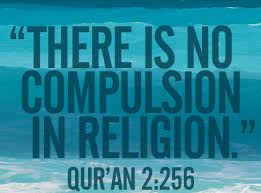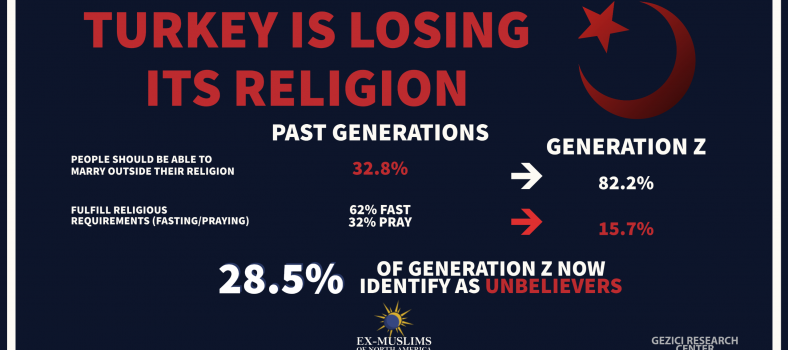On ‘There is no compulsion in religion’
 There is a huge misconception that I am progressively angrier about, largely because of the way it is wielded. It concerns 2:256, the famous Qur’anic verse that states ‘There is no compulsion in religion’, which is often quoted in part* and taken as evidence that Islam is tolerant of non-Muslims.
There is a huge misconception that I am progressively angrier about, largely because of the way it is wielded. It concerns 2:256, the famous Qur’anic verse that states ‘There is no compulsion in religion’, which is often quoted in part* and taken as evidence that Islam is tolerant of non-Muslims.
The rest of the verse continues with something like ‘truth is clear from error’, followed with something about how those who reject evil and believe in God are guided with a firm handhold and God can see everything you do. Here is a link to a Qur’an with three searchable English translations to compare the wording of the full verse, whose Arabic I have had memorized from when I was a child since it is a seminal verse often-discussed in sermons.
The full context reveals that the verse is at least directly talking about faith and conviction rather than treatment of non-Muslims, making both a claim to the (purported) self-evidence of Islam and a rather self-evident point about how someone can’t be compelled to actually believe and it’s up to them to have faith, to choose the path of truth–being Islam here–over the path of error, a discussion that does not necessarily entail anything about how to treat those who don’t believe (though framing faith in Allah as the true path is itself already arguably judgmental of disbelievers).
In short: while you can’t compel me to believe according to this verse…that doesn’t mean you can’t punish me if I don’t.
I know there are various interpretations of 2:256 (even the wiki page on 2:256 provides a range of them as a cursory, though imo selective, survey of the scholarship on the issue) and I also know that moderates adhere to an interpretation that claims apostates shouldn’t be punished or coerced because of non-belief, and indeed, to their credit, try to normalize that interpretation.
However, there is vast scholarship that simply disagrees, and in general the moderate view glosses over not only scholarship of that sort, but the larger context of interpretation of sundry other Qur’anic verses and ahadith that dictate and influence the treatment of those we who don’t believe and/or talk about us in extremely dehumanizing terms. And indeed, the denigration and denunciation of the kafir in the Qur’an is thorough and ubiquitous, and reflected in the discourse produced by Muslim scholarship hubs and official religious bodies and extending down into our social norms.
Take for instance, in contrast (or perhaps quite comparable) to 2:256, verse 3:85, which states quite clearly that anyone who desires a religion other than Islam will not have that accepted of them and will have lost in the hereafter. (Again, you can look up three different translations here.)
And unfortunately the prevalence of intolerance towards non-Muslims within Muslim scripture, interpretation, and practice is not a mere theoretical discussion, but a matter of real-world consequences.
Apostasy comes at a huge price for most ex-Muslims. Loss of belief is often linked to loss of humanity, reason, or morals, and apostates are subject to risking their safety, freedom, relationships with friends and family, jobs, social standing, or even their lives. And this unfortunately happens far more than we can track (just as honor crime and FGM do within insular communities even in the West), although we try to create safe spaces for apostates to come out, because the severe stigma surrounding non-belief and non-believers serves to silence so many of us, such that we effectively go about living double lives for our own protection, and nobody outside our world knows what’s happening with us or can intuit the scope of the problem. This pew poll on the countries that still legally outlaw apostasy and blasphemy is telling, but can only account for a small part of the problem, as much of our suffering is driven by other institutions than the legal, such as the social and economic, that are empowered by Islamic values and norms.
And I am frankly tired of begging to be heard over an uncritical, unequivocal insistence that any claim of systemic Muslim intolerance arises from simple hatred and misunderstanding of Muslims, this insistence bolstered by an eagerness to believe the mildest, kindest version of Islam presented by moderates to the West, as that makes the task of combating anti-Muslim bigotry so much easier, simpler.
What is particularly frustrating is that while many of those who endorse the moderate interpretation believe that it is not their place to judge or mistreat us, they also believe that we will be dealt with in the next life, that in fact the point is that it is not them but the creator that we are accountable to, that we are in fact committing the most dreadful sin conceivable and we do deserve to burn for eternity for it.
And just imagine how thinking that way about someone might cause you to view them–and indeed, there is severe disconnect between the moderate view and the hatred displayed towards apostates in general Muslim social settings, like surveys on the streets of Muslim-majority countries asking what people think of apostates or on Arab Twitter , let alone the living rooms we grew up in and the mosques whose lectures filled our Fridays and our ears with condemnation for the evil of non-belief. Unfortunately I am not shocked to hear ‘normal’ ‘everyday’ Muslims talk nonchalantly about murdering non-believers–because I grew up hearing that kuffar like me deserve either death or hell, depending on whether you think man or God or both should wield the punishment.
And you know what? The very next verse after ‘There is no compulsion in religion’ goes on to talk about how those who disbelieve will be the inmates of hell. Quite that literally. Go ahead, look it up right now. Verse 2:256 begins with ‘There is no compulsion in religion’ and verse 2:257 ends the reflection on faith and belief with a direct statement about how I’m going to abide in hell.
You see why I might be incredibly angry that the first bit of this scripture is continuously quoted out of context as evidence that there is no injunction to my mistreatment–though I am literally being condemned to burn in hell for my non-belief in the next breath.
And–permit me this reflection on how the apologetics surrounding this verse come off to us, we whose lives are torn to pieces over the stigma of apostasy–I sense there is also a sort of self-congratulatory condescension** attached to upholding this verse as a paragon of how well Islam treats others–just like I feel there is when moderates talk about the various rights and freedoms given to non-Muslims in a proper Islamic state (different, more limited than those given to Muslims) as a point of pride, like they’re being generous and, in some cases even superior to not be mistreating Christians and Jews in a number of ways. Although, really, the rules drawn up for the treatment of non-Muslims are not what we liberals or left-wingers or progressives would really consider equality at all, and is indeed a farce that breaks down under scrutiny and examination of a larger context (comparable to the verses contributing to stigma against apostates, the Qur’an has plenty negative, harsh, and dehumanizing things to say about Jews in general and Bani Isra’il in particular, and this is absolutely borne out in rampant, blatant anti-Semitism within Muslim-majority communities). This claim to ethical treatment breaks down under scrutiny not just as “there is no compulsion in religion” does but also just as “Islam grants women all the rights” does.
And I am so angry at the way never-Muslim people who purport to care extremely deeply about the safety and wellbeing of marginalized minorities play a role in propagating the moderate interpretation as representative of Islam, because many moderates do hedge against other interpretations with ‘that’s not the true Islam’–overlooking the fact that it is effectively the only real Islam experienced by far too many people and propagated by far too many groups, scholars, and regimes in far too many places, and that’s not theoretical. Even when it is not the intention to present the moderate interpretation as representative, elevating it to the exclusion and implied denial of other discourse on the issue effectively does just that.
And those who propagate the moderate Muslim narrative regarding the treatment of non-Muslims as representative of the true Islam are either not recognizing this as a No True Scotsman (Muslim version) or not knowing or indeed caring about how it contributes to the silencing and marginalization of apostates, how it basically calls us liars before we can even begin to open our mouths about our lives.
…and then a subsection of our allies, or at least a subsection of those on the left who care about anti-racism and the wellbeing of Muslims, especially Muslim women, turn around and endorse these already elevated, privileged voices at the expense of those of us who suffer in silence.
And let me tell you, I’ve been a moderate Muslim, and I’ve played that role myself before. And it’s not at all that I was being purposely deceptive whenever I defended Islam against any implication that it might not be perfect–it’s that I had my apologetics–and boy were they complex and convoluted– in line in a way that could explain away, through exegesis and jurisprudence, not just the surface inequalities I found in scripture, but also all these uncomfortable pangs about the violence and coercion and gender imbalance around me*** and that I heard about globally.
I would say things like, oh, the issues existed but were localized to a few problem areas, that they weren’t as prevalent as people made them out to be, that people did hate and did malign Muslims on purpose (I still believe this to be true, just manifesting in very different ways and for different reasons than I believed as a moderate Muslim), that a lot of Muslim terrorism was the work of Western imperialist powers****, that it was greed and misinterpretation and lack of education, not anything about Islam itself, that gave rise to violent and coercive practices, that so and so and such and such…a giant patchwork of explanation and justification for anything you could throw at me that might implicate Islam as a system rather than attribute all its problems to the sins of Western imperialism or the individual, non-systemic conduct of particular misguided Muslims.
…all so long as I could keep on not compromising my core belief as a Muslim that Islam was a perfect faith and living system. It was central to my Muslim identity and the fidelity of my worldview, so of course I had strong incentive to deny and explain away any criticism of circumstances actually attributed to Islam, by which I mean not one ‘proper’ version of the faith (‘my version’ say the moderates, say the radicals, say everyone in between), but some significant part of the collective, the multiplicity of Muslim scripture, practice, interpretation, and belief.
And in truth, one thing allies seem to forget or at least not take into account about moderate Muslims: that at the end of the day, they cleave to beliefs and values that are as a matter of faith uncompromising, many of which are not compatible with a secular worldview and, more importantly, that downplay or gloss over the struggles of those who have less rosy experiences under various Islams.
But no, a subsection of allies tend to trust anything and everything moderate Muslims say, and this does end up making things harder for rest of us–for instance, see my critique of this bit of Western-propagated apologetics, erasing the absolutely damaging effects of terms like ‘kafir’.
Because this is about the larger conversation of silencing, because the issue of 2:256 is only one of sundry examples.
I have similar frustrations about Western apologists who will go so far as to defend FGM and its legalization in the West, who continue to elevate the voices of Muslim women who insist the hijab is a free choice despite it being no such thing for literally millions of women worldwide, who claim the oppression of Muslim women is a lie, who defend the extremely inaccurate and dangerous apologetics of people like Reza Aslan while, heinously mischaracterizing ex-Muslim awareness work and simultaneously claiming allyhood to us, who continue to make erroneous analogies and conflations between Christian fundamentalism and Islamic fundamentalism glossing over very real difficulties and progressively intractable issues, who deny us the language to talk about the epidemic of honor crime sweeping our communities, claiming that it is no different than Western domestic violence (despite it being actually categorically different), who incredibly insultingly appropriate the struggle of women forced into and crushed by modesty doctrines by wearing hijab themselves for an hour or a day in order to ‘understand’ the struggle of their free-choosing hijabi friends, etc etc etc. I could go on, and will, in other posts, because there are tons and tons of examples of this coming up all the time, but it is too much and too heavy and for now I will stop there.
Like I said, the mind boggles.
*reminds me of how Leviticus re: men sleeping together is quoted only up until ‘abomination’ and not the violent putting to death part
**It reminds me of the self-congratulatory condescension in that type of ‘love the sinner hate the sin’ attitude expressed by many Christians about their gay friends and neighbors.
***especially as an expat in Saudi, where I could afford more detachment and less defensiveness than I could about the comparably harsh conditions women in Shia Lebanon faced, because I could explain or explain away everything about the latter, especially in light of my own erstwhile belief that the hijab I wore from the age of eight was my proud choice.
****also throw in some conspiracy theory stuff about about the rise of Al-Qa’ida and similar groups as deliberate inventions of the CIA or Mossad, which are considered salient political theories within the Arab populace at least, and indeed are what still drive Arab fascism in the form of partial public support for the Assad regime, to give one example



